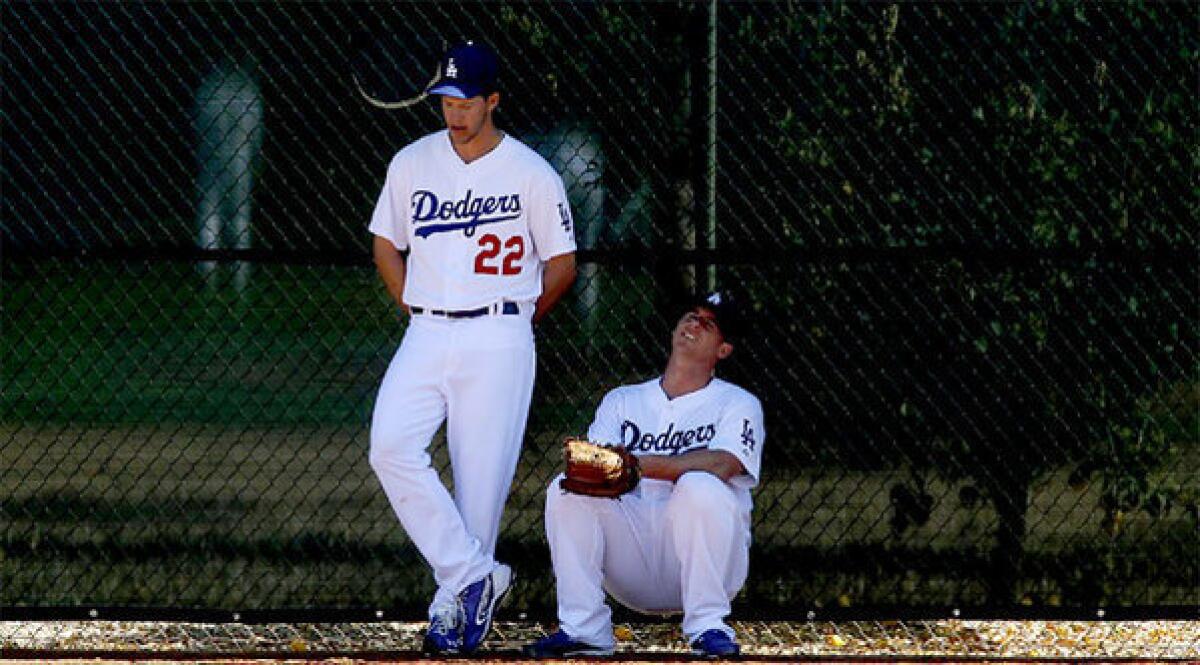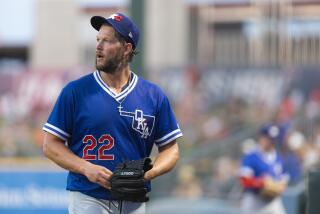This year, baseball’s long, hot summer will follow long, dull spring

PHOENIX — The Dodgers opened spring training before Valentine’s Day and won’t finish the last of their 40 exhibition games until the day before Easter.
The San Diego Padres will play a franchise-record 38 practice games this spring; the Angels will play 36.
For many veterans, spring training is little more than a long, tedious prelude to a long, tedious regular season. But this year, it’s even longer — and presumably more tedious.
“When you get to spring training, you’re always looking forward to the season,” Angels reliever Kevin Jepsen said. “You’ve been here for two weeks and you think, ‘Dang, we still have a month left.’ Sometimes it drags on.”
The extra time was necessitated by the 18-day World Baseball Classic, which began Saturday in China and Japan and will conclude March 19 at AT&T; Park in San Francisco. Approximately four dozen major leaguers and several more big league prospects dot the rosters of the 16 WBC teams. And because those players need extra time, both to get ready for the competition and then to reintegrate themselves with their major league teammates afterward, everybody else also had to show up early and stay late.
“To do it the right way you need to condition the players to participate in the tournament,” said Dodgers General Manager Ned Colletti, whose team sent six players to WBC teams. “Because it’s a high-stakes tournament. It’s big. It’s real.”
For those who stay behind, though, it’s real boring.
“It’s long,” Dodgers utilityman Skip Schumaker said. “For the older guys, you know how many at-bats you need to get ready and feel good. And a lot of us feel good after a couple of weeks and you’re ready for the season to start.”
That has made team-building distractions, such as the Dodgers’ annual rookie hazing event, even more important as a way to alleviate the boredom. Last Sunday, the team staged an “American Idol”-type competition called “Dodger Idol,” in which every player participating in his first camp was required to perform.
The Dodgers have also organized a competitive table tennis tournament, while the Angels begin every day with a closed-door meeting in which Manager Mike Scioscia assigns challenges, surprises and pranks, from interviewing the Phoenix Suns cheerleaders and completing a college-level algebra exam to creating a video report on a local Renaissance festival or assembling items purchased at a local Toys R Us.
Even that can get old after a month, though.
“To have our regulars here this long? No benefits,” Milwaukee Brewers Manager Ron Roenicke said. “It’s really hard, because once they start playing a lot they feel like they’re ready to go. Even in a normal spring training, that last week is when you really have to keep them motivated. Now, you add a week onto that and it makes it tougher.”
The additional time has also meant altering the way teams traditionally handle their pitching staffs. While the Dodgers put Clayton Kershaw and Zack Greinke into their first two exhibition games, the Angels, Chicago White Sox, Kansas City Royals, Baltimore Orioles and others held back their starters for the first week, keeping their rotations on a regular spring-training schedule.
The longer spring training apparently has been tough on fans, too. Last year, when only one team played more than 33 exhibitions in Arizona, a record 1.68 million fans turned out for the games, and the Cactus League generated an economic impact of $422 million in the state during spring training, according to two studies cited by the league and three state agencies. But with more games spread over a longer period this year, attendance has been down across the league.
“Even the [usual] five weeks for position players is too long. Guys don’t need that,” said Scioscia, who is losing three players to the WBC. “When spring training was designed, most guys came in to get into shape. Now most guys come in in shape and ready to hit the field and get into drills and work some of the stiffness out.
“It’s nice to say we have this extra time, but when you get to March 20 these guys have peaked. They want to get out there and play.”
For others, the extra time can help launch a career. Schumaker had 26 career plate appearances when he showed up to an extended spring training before the first WBC in 2006. He got 64 at-bats that spring and made the St. Louis Cardinals’ opening-day roster.
For players rehabilitating injuries the extra time can he helpful as well.
“It’s a benefit to me because the four, five days I did lose are not going to hurt me,” said Angels reliever Sean Burnett, who is coming off October surgery to remove bone spurs from his elbow and missed time during the first week of camp because of back stiffness. “If you do have an injury or are coming back from surgery, you can be a little more cautious with an extra week or two.”
Still, the consensus among Burnett’s teammates in the Angels bullpen is a spring training interrupted by snow — as this one was last month — is simply too long.
“During spring training, you get into a rhythm: meeting at 9:30, on the field, day in, day out. The longer you’re here, you start noticing,” Jepsen said. “And we’re only just hitting March? We have a month left.”
kevin.baxter@latimes.com; Twitter: @kbaxter11
mike.digiovanna@latimes.com; Twitter: @MikeDiGiovanna
More to Read
Go beyond the scoreboard
Get the latest on L.A.'s teams in the daily Sports Report newsletter.
You may occasionally receive promotional content from the Los Angeles Times.












